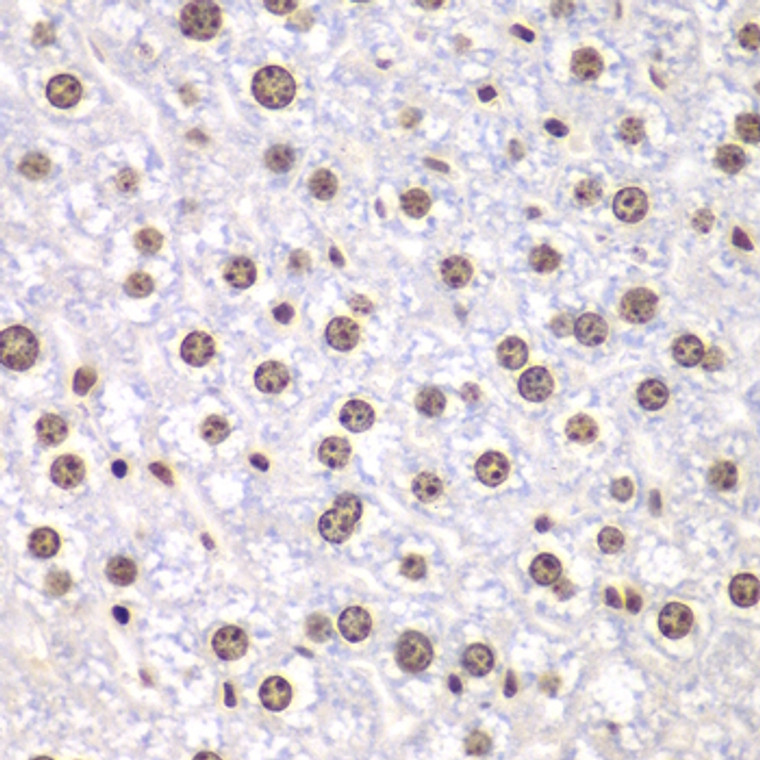| Host: |
Rabbit |
| Applications: |
WB/IHC/IP |
| Reactivity: |
Human/Mouse |
| Note: |
STRICTLY FOR FURTHER SCIENTIFIC RESEARCH USE ONLY (RUO). MUST NOT TO BE USED IN DIAGNOSTIC OR THERAPEUTIC APPLICATIONS. |
| Short Description: |
Rabbit polyclonal antibody anti-TOP1 (1-100) is suitable for use in Western Blot, Immunohistochemistry and Immunoprecipitation research applications. |
| Clonality: |
Polyclonal |
| Conjugation: |
Unconjugated |
| Isotype: |
IgG |
| Formulation: |
PBS with 0.02% Sodium Azide, 50% Glycerol, pH7.3. |
| Purification: |
Affinity purification |
| Dilution Range: |
WB 1:500-1:2000IHC-P 1:50-1:200IP 1:20-1:50 |
| Storage Instruction: |
Store at-20°C for up to 1 year from the date of receipt, and avoid repeat freeze-thaw cycles. |
| Gene Symbol: |
TOP1 |
| Gene ID: |
7150 |
| Uniprot ID: |
TOP1_HUMAN |
| Immunogen Region: |
1-100 |
| Immunogen: |
A synthetic peptide corresponding to a sequence within amino acids 1-100 of human DNA topoisomerase I (DNA topoisomerase I (TOP1) ) (NP_003277.1). |
| Immunogen Sequence: |
MSGDHLHNDSQIEADFRLND SHKHKDKHKDREHRHKEHKK EKDREKSKHSNSEHKDSEKK HKEKEKTKHKDGSSEKHKDK HKDRDKEKRKEEKVRASGDA |
| Tissue Specificity | Endothelial cells. |
| Post Translational Modifications | Sumoylated. Lys-117 is the main site of sumoylation. Sumoylation plays a role in partitioning TOP1 between nucleoli and nucleoplasm. Levels are dramatically increased on camptothecin (CPT) treatment. Phosphorylation at Ser-506 by CK2 increases binding to supercoiled DNA and sensitivity to camptothecin. |
| Function | Releases the supercoiling and torsional tension of DNA introduced during the DNA replication and transcription by transiently cleaving and rejoining one strand of the DNA duplex. Introduces a single-strand break via transesterification at a target site in duplex DNA. The scissile phosphodiester is attacked by the catalytic tyrosine of the enzyme, resulting in the formation of a DNA-(3'-phosphotyrosyl)-enzyme intermediate and the expulsion of a 5'-OH DNA strand. The free DNA strand then rotates around the intact phosphodiester bond on the opposing strand, thus removing DNA supercoils. Finally, in the religation step, the DNA 5'-OH attacks the covalent intermediate to expel the active-site tyrosine and restore the DNA phosphodiester backbone. Regulates the alternative splicing of tissue factor (F3) pre-mRNA in endothelial cells. Involved in the circadian transcription of the core circadian clock component BMAL1 by altering the chromatin structure around the ROR response elements (ROREs) on the BMAL1 promoter. |
| Protein Name | Dna Topoisomerase 1Dna Topoisomerase I |
| Database Links | Reactome: R-HSA-4615885 |
| Cellular Localisation | NucleusNucleolusNucleoplasmDiffuse Nuclear Localization With Some Enrichment In NucleoliOn Cpt TreatmentCleared From Nucleoli Into NucleoplasmSumoylated Forms Found In Both Nucleoplasm And Nucleoli |
| Alternative Antibody Names | Anti-Dna Topoisomerase 1 antibodyAnti-Dna Topoisomerase I antibodyAnti-TOP1 antibody |
Information sourced from Uniprot.org
12 months for antibodies. 6 months for ELISA Kits. Please see website T&Cs for further guidance









